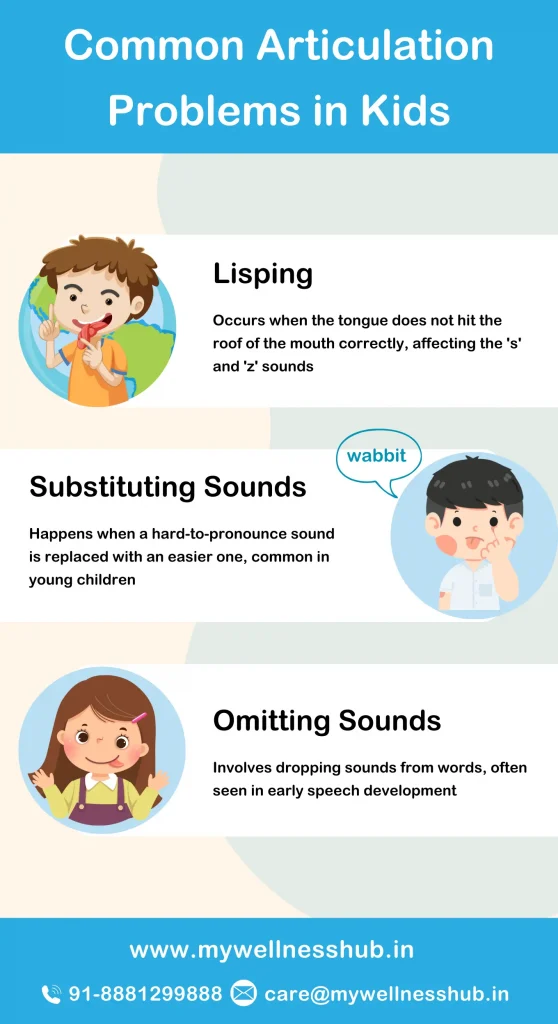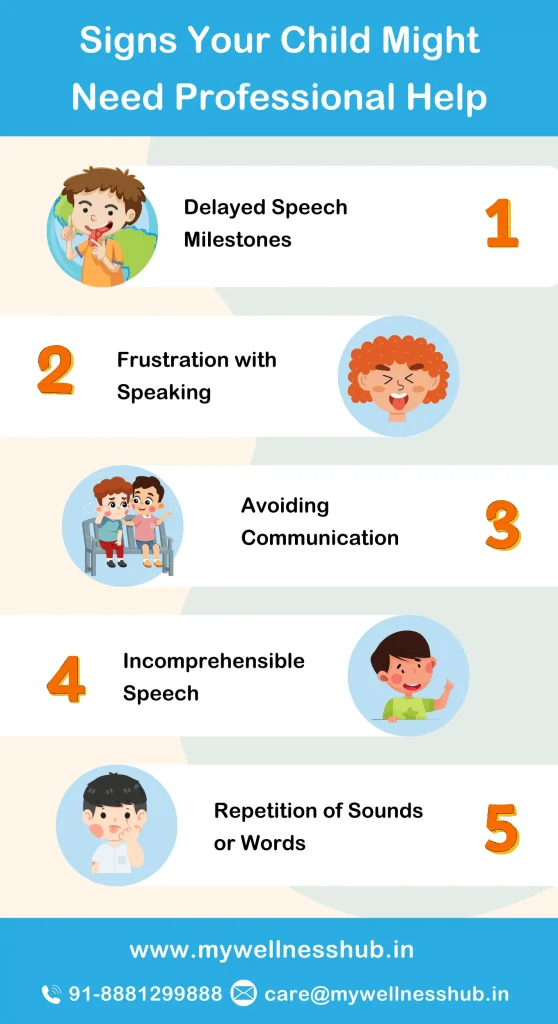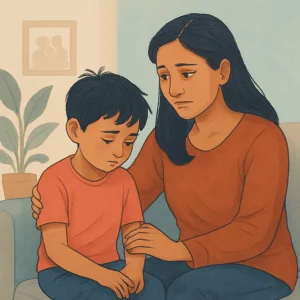Simple Ways to Help Kids with Articulation Problems at Home
By Rajini D
Last Updated: January 20, 2025
Articulation problems in children involve difficulties with pronouncing sounds correctly, which can affect how they communicate and are understood. Issues may manifest as substituting, omitting, or distorting sounds, like saying ‘wabbit’ for ‘rabbit.’ Addressing these problems early with home articulation tips is crucial; it helps prevent the issues from becoming ingrained and supports better literacy and social skills. Early intervention ensures that children can express themselves clearly, enhancing their confidence and participation in daily interactions.
Understanding the Causes of Articulation Issues

Articulation issues in children can sometimes make parents feel anxious, but understanding the causes behind these speech problems can be the first step towards helping your little one find their voice. Let’s explore what might be affecting your child’s ability to articulate clearly and when it might be time to seek some expert advice. Utilizing home articulation tips early on is crucial in this process, ensuring that intervention begins at home where children are most comfortable
Common Causes of Articulation Problems in Kids
Articulation, or the ability to produce clear and precise sounds, is a critical part of a child’s speech development. Various factors can influence how well a child articulates words:
- Developmental Delays: Some children simply take longer to start talking than others. This delay can extend to their ability to articulate sounds clearly.
- Hearing Impairments: Good hearing is crucial for a child to learn how to pronounce sounds correctly. Even mild hearing loss can affect a child’s ability to hear and replicate the sounds they need to form words.
- Structural Anomalies: Issues like a short frenulum (the fold beneath the tongue), cleft palate, or misaligned teeth can restrict the movements necessary for making certain speech sounds.
- Motor Skill Difficulties: Some children struggle with motor skills, including those needed for speech, like the ability to move the tongue to the correct position to produce sounds.
- Family History and Genetics: Sometimes, the tendency to develop speech articulation issues runs in families.
Know more about on Can Poor Articulation Affect My Child’s Reading and Writing?
Essential Home Exercises for Speech Clarity
Helping your child improve their speech clarity can be a fulfilling activity, not just for developmental progress but also for bonding. Here, we’ll dive into some fun articulation activities and daily speech therapy techniques that you can easily incorporate into your home routine, ensuring your child’s speech journey is both enjoyable and effective. Utilizing these home articulation tips will empower you to support your child’s communication skills right where they learn best—at home.
Fun Articulation Activities to Try at Home
Engaging your child in playful activities can significantly enhance their articulation skills without them even realizing they’re practicing. Here are a few games designed to make speech practice as fun as playtime, serving as effective home articulation tips. These simple strategies ensure that learning to speak clearly can be a delightful part of daily life at home.
- Animal Sound Safari: Create a pretend zoo at home and walk through different sections, encouraging your child to mimic the animals’ sounds. This game helps with the articulation of specific consonants and vowels, depending on the animal sounds you choose (e.g., “roar” for R sounds, “moo” for M sounds).
- Treasure Hunt for Sounds: Hide objects around the house that start with a specific sound your child needs to work on. As they find each item, have them say the word out loud. For example, if working on the “S” sound, you might hide a spoon, sock, or soap.
- Mystery Bag: Fill a bag with small household items or toys, and have your child reach in to pick an item without looking. They must say the name of the item as clearly as possible. This game is excellent for practicing all sounds and keeps them guessing what’s next!
Also read: Fun and Effective DIY Articulation Games with Household Items
Daily Speech Therapy Techniques
Incorporating speech therapy into daily routines doesn’t have to be a chore. Here are some simple methods to weave speech practice into everyday activities:
- Mealtime Talk: Use mealtime as an opportunity to practice speech. Discuss the foods on the table, emphasizing the sounds your child struggles with. For instance, if they’re working on the “B” sound, you could talk about bread, butter, and beverages.
- Storytime Shifts: During your regular reading routine, pause to let your child articulate the end of sentences, especially those with target sounds. This technique encourages them to focus on pronunciation in a relaxed setting.
- Singalong Sessions: Singing slows down words and stretches sounds, which can help with articulation. Sing nursery rhymes or any favorite songs, emphasizing clarity and articulation.
Daily Speech Therapy Techniques
| Activity Type | Description | Purpose |
|---|---|---|
| Animal Sound Safari | Pretend zoo at home where children mimic animal sounds like “roar” or “moo” | Helps articulate specific consonants and vowels |
| Treasure Hunt for Sounds | Hide items starting with a specific sound for the child to find and articulate, e.g., spoon, sock, soap | Focuses on practicing specific sounds |
| Mystery Bag | Children pick items from a bag without looking and articulate the item’s name | Enhances articulation of various sounds |
| Mealtime Talk | Discuss foods, emphasizing sounds the child struggles with | Integrates speech practice with daily meals |
| Storytime Shifts | Child articulates the end of sentences during reading | Improves pronunciation in a relaxed setting |
| Singalong Sessions | Singing songs to slow down words and stretch sounds | Aids in articulation through musical rhythm |
The Role of Parents in Speech Development
Parents play a crucial role in the speech and language development of their children. By creating a supportive environment at home and implementing effective home articulation tips, parents can significantly enhance their child’s communication skills. Let’s explore how you can effectively support your child’s journey toward clearer communication by monitoring their progress and using these strategies daily.
Creating a Supportive Environment at Home
Creating a nurturing environment that promotes speech development involves more than just talking to your child. Here are some effective ways to encourage speech and language development:
- Be an Active Listener: Show interest in what your child says. Respond to their attempts to communicate, which reinforces their efforts and encourages them to continue practicing.
- Expand Conversations: When your child speaks, add more detail to what they say. For example, if they say, “dog big,” you could respond with, “Yes, that is a big dog. It’s a big, brown dog.”
- Read Together: Regular reading sessions not only introduce your child to new vocabulary but also help them understand sentence structure and sound patterns. Choose books that are engaging and age-appropriate.
- Sing Songs and Nursery Rhymes: These are great for rhythm and rhyme, helping children learn the musical aspects of language, which can improve their articulation and fluency.
When to Consult a Professional Speech Therapist

While many parents play an active role in their child’s speech development using home articulation tips, there are times when professional help might be necessary. Knowing when to seek a speech therapist and how to choose the right one can make all the difference in your child’s progress. Let’s discuss the signs that indicate it might be time to consult with a specialist and how to find the best therapist for your child.
Signs That Professional Help is Needed
It can sometimes be difficult to determine when a child’s speech issues are part of typical development and when they might require professional intervention. Utilizing home articulation tips effectively is a good start, but here are some clear indicators that consulting a speech therapist could be beneficial:
- Delayed Speech Milestones: If your child is not meeting standard speech development milestones (e.g., not babbling by age 1, not speaking in sentences by age 3), it might be time to consult a professional.
- Difficulty Forming Sounds or Words: Difficulty with articulating words or consistently mispronouncing sounds beyond the typical age of acquisition could indicate underlying issues.
- Frequent Frustration in Communication: When a child frequently shows signs of frustration or avoids speaking because it’s difficult, this can affect their social interactions and self-esteem.
- Limited Vocabulary for Age: If your child’s vocabulary is significantly smaller than that of peers, this might signal a problem with language acquisition.
- Understanding Speech: Difficulties in understanding instructions or responding appropriately might also suggest it’s time to see a therapist.
How WellnessHub Supports Your Child’s Speech Development
At WellnessHub, we’re dedicated to helping kids improve their speech and communication skills. Here’s how our services can make a difference for your child.
About WellnessHub and Our Services
WellnessHub specializes in speech therapy that’s tailored to each child’s needs. Here’s what we offer:
- Personalized Speech Therapy: One-on-one sessions with certified therapists who know how to work with kids.
- Online Resources: Fun apps and tools that make speech practice enjoyable right from home.
- Parent Workshops: We teach you how to help your child improve at home.
- Detailed Assessments: We evaluate your child’s speech issues and track their progress.
Conclusion
Helping your child improve their speech involves fun daily activities and the right tools. Remember, each child’s journey is unique, so stay patient and keep practicing. Use engaging apps and simple homemade tools to make learning enjoyable and effective. If you see slow progress or get worried, consider talking to a speech therapist for guidance. At Wellness Hub, we’re here to support you with practical tips and professional advice. For more resources on speech improvement, visit our speech therapy resources page. With consistent effort and the right support, your child will be chatting more clearly in no time!
Frequently Asked Questions:
1. What are the best daily speech activities for kids?
Daily speech activities that are effective include reading aloud together, describing actions during play, and repeating nursery rhymes. These activities help improve vocabulary and pronunciation by integrating speech practice into fun, everyday interactions.
2. How can I make speech therapy fun at home?
Making speech therapy fun can involve using games, creating a reward system, and incorporating your child’s favorite toys or characters into therapy sessions. Apps and online videos that focus on speech development can also add a playful element to learning.
3. What are the signs my child needs speech therapy?
Signs that your child may benefit from speech therapy include not meeting language milestones, difficulty pronouncing words, frustration when trying to communicate, and limited vocabulary compared to peers. If you observe any of these signs, consulting with a speech therapist can provide tailored support.
4. How often should my child practice speech exercises?
Regular practice is key to progress in speech therapy. Ideally, short, focused sessions a few times a day can help reinforce new skills. Consistency and repetition are crucial, as they help build muscle memory and confidence in speech.
5. Can apps improve my child’s speech development?
Yes, there are many educational apps designed to enhance speech and language skills through interactive and engaging activities. These apps often use games to teach sounds, words, and sentence formation in a context that keeps children motivated.
6. What simple tools can I use for speech therapy at home?
Simple tools like flashcards, mirrors, and homemade items can be very effective for speech therapy. For example, using a mirror can help your child see how they form their words, aiding in correct pronunciation.
7. How do I choose the right speech therapist for my child?
When choosing a speech therapist, consider their qualifications, experience with children, and approach to therapy. It’s important to find someone who makes your child feel comfortable and matches your family’s needs.
8. What are easy ways to track my child’s speech progress?
Keeping a log of the new words your child learns, recording their speech during different exercises, and noting improvements in clarity can help you track progress. This documentation is also useful for any professionals working with your child.
9. How can I help my child articulate words more clearly?
Encouraging slow and deliberate speech, practicing specific sounds, and breaking words down into smaller, manageable parts can help improve articulation. Using feedback and correct repetition also aids in developing clearer speech.
10. When will I see improvement in my child’s speech?
Speech improvement timelines vary depending on the child’s initial challenges and the frequency of practice. Generally, with consistent therapy and home practice, improvements can be observed within a few months. However, patience is key.
About the Author:
Rajini Darugupally
M.Sc., Speech-Language Pathologist (9+ years of experience)
Rajini is a passionate and dedicated Speech-Language Pathologist with over 9+ years of experience, specializing in both developmental speech and language disorders in children and rehabilitation in adults. Currently, at Wellness Hub, she thrives in a team environment that values innovation, compassion, and achieving results for their clients.
Book your Free Consultation Today
Parent/Caregiver Info:
Client’s Details:
* Error Message









